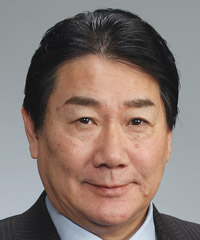News Backgrounder
JAL boss wants answers about slots "spoils"
November 1st 2013
Japan Airlines (JAL) president, Yoshiharu Ueki, is threatening to sue the Japanese transport department over its recent decision to give All Nippon Airways (ANA) more than double the number of new day time international slots at Tokyo’s Haneda Airport than JAL.Read More »
Ueki told media in Tokyo last month that JAL: reserved the right to sue the government, an unprecedented move in Japan. “Sometimes things have to be said, sometimes things have to be done,” Ueki said.
 |
| Japan Airlines president, Yoshiharu Ueki: prepared to sue government over Haneda slots decision |
Japan’s transport ministry officials found themselves at the centre of this heated dispute after ANA received 11 of the valuable new slots and JAL was given five.
Ueki said he was “shocked” at the decision and has formally requested the ministry to disclose the reasons for the decision, including documentation that supports the division of the slot “spoils” between the two rival international carriers. If the ministry can’t offer a convincing explanation, Ueki indicated he would seek a review of the controversial decision.
At press time, the Ministry of Land, Infrastructure, Transport and Tourism (MLIT) had not responded to JAL’s request, which further fermented public speculation that the decision was politically based.
The allocation of the 16 new daytime international slots at Tokyo Haneda, the city’s downtown international airport, follows distribution earlier this year of domestic slots at the airport, which is 15 kilometers from central Tokyo. In the Spring 2013 allocation, ANA was given eight slots. JAL received three.
JAL’s Ueki has refrained from commenting about the possible reasons for ANA’s fortunate allocation, but there is plenty of speculation that the recent decision was influenced by politics. It is no secret in Japan that members of the ruling party, the Liberal Democrats (LDP), were very critical of the way the former government, led by the Democratic Party of Japan (DPJ), handled the JAL bail-out and rehabilitation.
Transport minister, Akihiro Ohta, claimed in a statement that the DPJ-organized bail-out of JAL had created a gap between the two carriers, which needed to be rebalanced to ensure “fair competition”. This opinion is disputed, with JAL and its supporters claiming that the bailout and subsequent rehabilitation were legal and transparent.
Revered tycoon, Kazuo Inamori, who was appointed to head the remaking of JAL, is very close to the DPJ, who took over from the Liberal Democratic Party (LDP). JAL also enjoyed close ties with LDP politicians, who were widely believed to have had considerable influence over JAL’s strategic management decisions including new, mostly domestic routes. Now the LDP is back in power, opposition to JAL, as a symbol of the DPJ, has increased.
An unnamed LDP official told the leading Japanese newspaper, Nihon Keizai: “We will not save JAL next time, even if its business fails.”
In its submission to the MILT about the slot ruling, JAL argued the allocation of national assets, such as departure and arrival slots, were not made from the standpoint of customer convenience and the national interest.
“Additionally, no rational reason was given by the MLIT about how the current allocation would bring about such benefits,” JAL said.
“We received the explanation that this decision was made based on whether or not the criteria pertained to the establishment of a given new route. It has not been specifically explained why new criteria have been abruptly established. Also no explanation has been given about why routes established at Tokyo’s Haneda Airport are to be regarded as “new”, or how they might impede or distort an appropriate competitive environment.”